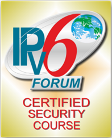Certifications
All Erion IPv6 courses are certified by the IPv6 Forum. Erion also has its own IPv6 certification programme.



The growth of the Internet and the wide-spread use of computer networks have brought great benefits to businesses. At the same time they have opened up business systems to remote hacking from employees through to anonymous crackers at the other side of the world.
The related growth in network applications has increased the complexity and consequently the vulnerability of networked systems.
Whilst techniques to secure network systems exist they are many and complex. This course gives the attendee a good understanding of network security risks and the appropriate techniques that can be used to reduce and control those risks.
This course is ideal technical staff and managers involved in network management. It is helpful if attendees have a basic understanding of networking principles but background information is supplied throughout the course.
During the course there will be a number of short demonstrations.
Demonstrations will be on the following operating systems (Windows and Linux)
All Erion IPv6 courses are certified by the IPv6 Forum. Erion also has its own IPv6 certification programme.



All our trainers are practising network consultants with extensive experience with network security.
Our courses are available world-wide in our virtual classrooms accompanied by virtual labs. We also deliver on-site training and public training at venues around the world.
Please contact us if you are looking for training in your area.